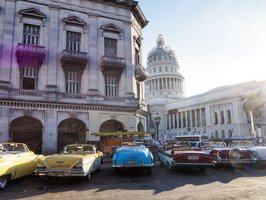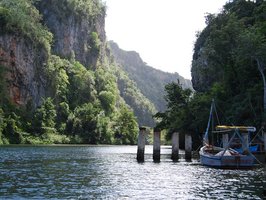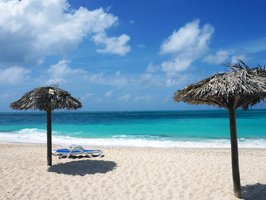Cuba Travel Information
Entry & Exit
- Australian
- British
- Canadian
- USA
- Members of the European Union
When packing for your vacation in Cuba, there are a few things to consider. Remember that custom violations are extremely severe transgressions and can put a damper on a holiday if not followed correctly.
Passengers over the age of 18 can take the following items into Cuba:
200 cigarettes, 50 cigars or 250 grams of tobacco.3 bottles of alcoholic beveragesUp to 10 kilograms of medication if stored in a separate bagPassengers over the age of 18 can take the following items out of Cuba:
200 cigarettes, 50 loose or unwrapped cigars5 bottles of alcoholic beverages provided a receipt is presented upon requestSouvenirs and sold goods up to the value of US$1000It is illegal to carry the following items in Cuba:- All kinds of seeds, fresh animal or vegetable products – unless special permission has been granted by the Ministry of Agriculture.
- Narcotics, drugs or any other illegal substances. Medication is to be accompanied by a valid medical prescription and should be clearly labelled.
- Hemoderivatives
- Explosives, firearms and ammunition
- Obscene and pornographic material
- Household appliances
Tourists can carry unlimited amounts of foreign currency as long as amounts exceeding US$5000 be declared upon arrival.
As of May 1st 2015, the departure tax usually charged at the airport, will be charged to the airline, and included in your flight price.
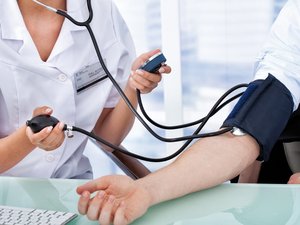
Tourists are advised to go for a full medical 4-6 weeks prior to their departure. It is advisable for all tourists to remain up to date with their vaccinations and protect themselves by receiving the following vaccinations prior to their departure.
- Routine Vaccinations should be up to date before travelling to Cuba – these vaccines include the MMR vaccine, Tetanus-Diphtheria, Varicella vaccine, Polio vaccine and an annual flu shot.
Tourists are recommended to be vaccinated against the following illnesses and should follow the advice of local health and safety organisations:
- Typhoid
- Hepatitis A
- Rabies
- Hepatitis B
Travel Facts for Cuba
In general Cuba is a very safe country to travel compared to other Latin American countries. You still shouldn't show around your valuables. Leave everything you don't need in the lockers of your hotel room. The Cubans are always trying to help if you need something.
Cuba is an island country which boasts a subtropical climate and approximately 330 days of sunshine a year! The climate can be clearly defined by two main seasons – namely the wet and dry season.
From November until April, Cuba enjoys the dry season with cool temperatures averaging 25◦C. This is the busiest tourist period as the pleasant temperatures and inviting beaches attract visitors from all over the world.
The wet season takes place from May to October and brings with it warm temperatures and the threat of hurricanes. Hurricanes do not strike annually but when they do, they cause havoc resulting in floods, damages and forced evacuations.
June to September are the hottest months by far, but the trade winds make the hot temperatures bearable and almost pleasant.
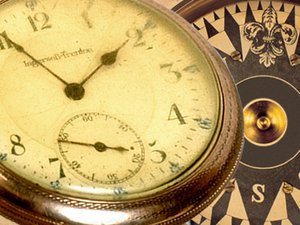
Cuba falls into the UTC/GMT-04:00 times zone and makes use of daylight savings time. Daylight saving usually begins in March, resulting in the clock going one hour ahead and ends in November resulting in the clock going back one hour.
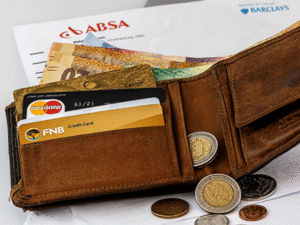
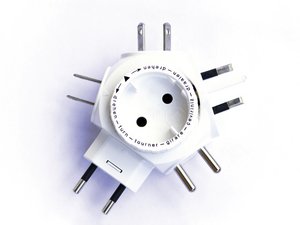
Cuba has a mix of electrical currents and plug types, but the majority of the hotels use a 110 volt current and a standard US-style two or three prong plug outlet. Hotels that cater towards the European market usually make use of a 220 volt current, so it is always advisable to bring an adaptor with you and check with the hotel prior to arrival.
Cell phones can be hired in Cuba or tourists can make use of public telephones found in hotels, resorts and large tourist areas. Cuba’s country code is (+53) while the area codes differ – hotels will have a directory with area codes as well as international codes. In order to dial an international number from Cuba, tourists will need to dial: 00 (country code) (area code) and then the number.
Internet is accessible in hotels and resorts through WiFi, as well as roaming. In order to enable data roaming, tourists will need to activate it with their own network company, although data roaming charges are extremely high.
Tourists should keep these numbers and addresses handy at all times.
- Ambulance – Havana – 104
-Pinar del Rio – 76 2317
- Police – Havana – 106
-Pinar del Rio – 106
- Fire station – Havana – 105
-Pinar del Rio – 105
Hotels and resorts in Cuba do have medical practitioners on staff or on call at all times, so don’t be afraid to ask reception to contact a doctor if necessary.
People and Landscape
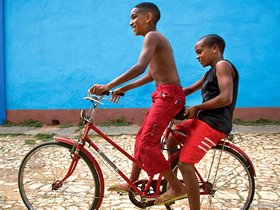
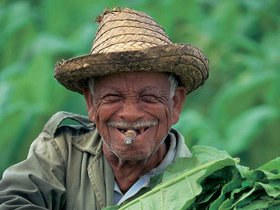
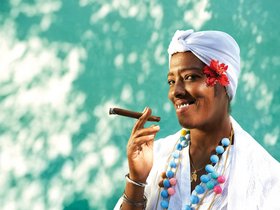
Cuban nationals are made up of a variety of ethnic groups, contributing effortlessly to the nation’s quintessential multicultural culture. With over 11.2 million people in Cuba – the country boasts a diverse and dynamic nation, making it the second most populated country in the Caribbean.
64% of that 11.2 million are white individuals, with 27% made up of the Mulatto/Mestizo community and 9% are black. In a country where diversity has come to be treasured rather than discriminated against, it is no wonder Cuba is a safe and magnificent country favoured by people from all over the world.
Most tourist arrive at one of the international airports Varadero, Havana, Cayo Coco or Holguín. For families and groups it is recommandable to book a private transfer. Special tourist taxis are identifiable from the blue "T" on the front door. Discus the price before the trip, if you can't see a taximeter. The shared taxis - called "colectivos" - are cheaper but harder to find.
The small pedicaps, also called "Coco Taxis" are recommendable for short tours.
The streets of Cuba are mostly in a good conditions. You should always bring a road map with you because the street signs are not complete in all parts of the country. Some isolated and not often used roads are in bad conditions, this is why forward-looking manner of driving is important. You need to be careful at grade crossings, because they don't have any gates. You should respect the tempo limit (50 km/h in the cities, 90 km/h on country roads, 100 km/h on the highways). Driving by night is not recommended.
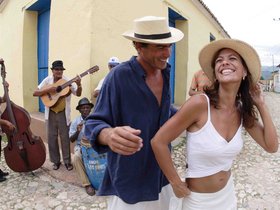
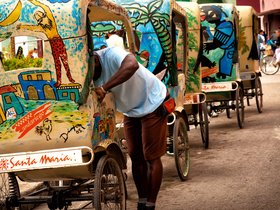
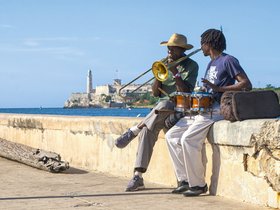
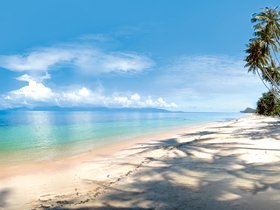
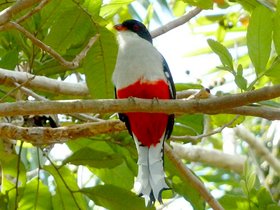
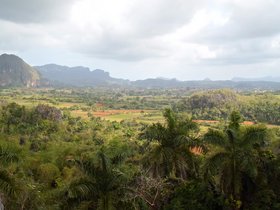
Cuba has breath-taking wild landscapes, charming cities, and compelling historic sites. Conservation has been a priority of the Cuban government for decades and its preservation efforts make it a great place for eco-tourism. Here you'll find coral reefs, sea turtles, painted snails, and the infamous jumping crocodiles. Visit Cuba to experience unparalleled natural beauty.
One of the most important economies in Cuba is the tourism. Beside this sector you can also find sugar-, nickel-, rum-, coffee-, and pharmaceutical industries. After the revolution 90% of the industry and 70% of the agriculture were nationalized. With the help of the states of the former Eastern Bloc, the industry and agriculture was developing well. The crush of the Eastern Bloc, however, led to a serious economic crisis in Cuba. A recovery from this crisis was only reached in 1993, when the government allowed private companies and the possession of US Dollar was not prohibited anymore for Cubans. The economic situations is still strained.
Cuba has a very good health care system. The island has many health stations, that are offering a free medical treatment, even at the countryside. The has positive effects on the health of the locals. They have 175 doctors per 1.000 inhabitants. Due to this health care system the infant mortality is the lowest in all of Latin America and the life expectancy is as high as in most western industry countries. The state is investing much in the research of biotechnology and medicine, which allowed Fidel Castro's scientists to find vaccination for meningitis and treatments for different kinds of cancer.
The educational system is very good as well and free for all Cubans. The government is supporting the society and provides all materials needed for the class. Cumpulsory education is persists until 10th grade. All Cuban children are wearing school uniforms to hide the difference between rich ans poor families. It's not clear until when Cuba can maintain this standard of education due to low payments for teachers.
Since 1961 the rate of analphabets sunk from 24% to 2%. To reach Fidel Castro's goal to lower the rate of illiteracy, everywhere in Cuba "Casas de la Cultura" were opened, which are still very popular. Many foreigners are coming to Cuba to study at the universities.
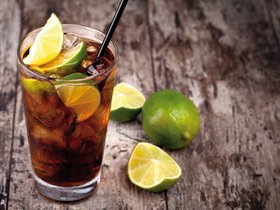
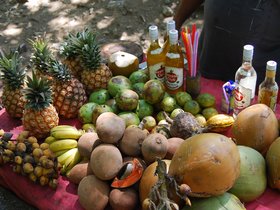
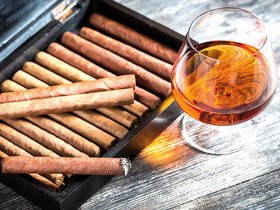
Cuban cuisine is delicious. There are many unique dishes to choose from, but most meals are paired with rice, black beans, plantains and yucca. Most meals also include roasted and fried meat - mainly pork, beef, and chicken. Fruits and vegetables are also served alongside almost every meal. Even though Cuba is in the Caribbean, seafood and lobster are not always on the menu. Sometimes these can be found in local restaurants. All meals are prepared simply, with a focus on flavour rather than presentation.
Avoid drinking tap water in Cuba. You should only use bottled water and ice made from water that has been boiled and then frozen.
In Cuba banks are open from monday to friday from 8:30am to 3 or 5pm. On the last day of the month they are only open until 12pm.
Hotels are normally open daily from 10:00am to 09:00pm. Tourist stores are open from 09:00am to 6:00pm. Sundays from 09:00am to 01:00pm.
A Casa Particular is a private accommodation, comparable with a guesthouse. Most of the offered rooms in the Casas Particulares are right next to the rooms of the locals. This gives you a good impression of the daily life of the Cubans and you can - if you want to - get in contact with the locals. The owners of the Casas Particulares can also prepare a breakfast for you. With us, you only book the accommodation, the breakfast can be booked on spot.
The equipment of the rooms is geared to the touristic standards and most of the time in a good quality. Usually there are 2-3 double rooms per Casa Particular. They all have a double bed or twin bed, have their own bathroom and a closet. Additionally most of them are air conditioned and/or have a television.
You can identify the Casas Particulares with the "blue roof" on the door. All Casas we offer are licenced by the government.
Havana - Viñales - Soroa - Cienfuegos - Santa Clara - Trindad - Playa Larga - Camagüey - Bayamo - Holguín - Santiago de Cuba - Baracoa
Sightseeing
There are many possibilities to spend your holidays in Cuba. No matter, if you want to discover the country on your own with a rental car, if you want to discover the capital Havana, visit the Viñales valley or make your was Eastwards - everything is possible. If you want to get active on you holiday you can explore the nationalparks by foot, climb the highest mountain, the Pico Turquino, cycle in the Sierra Maestra or go on a dive on the island Cayo Largo. The secret capital Santiago de Cuba or the colonial town Trinidad are also wating for you.
You can't decide for a certain route? What suits your expectations? More nature or more culture? We present all highlights of the country with a lot of information. Have a look at our Highlights in Cuba. Here you can get a lot of information and decide what you want to see.
If you are well informed about Cuba now, have a look at our Trips to Cuba or contact our team.
Current Situation
Please keep in mind, that the security situation at place can change at any time. Therefore we recommend to have a look at the current safety information at Global Affairs Canada or Foreign and Commonwealth Office.
Exclusion of Liability
Those who choose to travel do so entirely at their own risk. SC Travel Adventures endeavours to inform tourists of the risks involved with travelling but cannot be held liable for any events which occur outside of their direct control. Tourists are advised to avoid areas considered unsafe, remain vigilant and cautious at all times throughout their stay, and heed the advice of local authorities.

